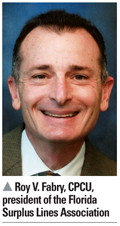 Roy V. Fabry, CPCU, is the new president of the Florida Surplus Lines Association (FSLA). The group, recognized as one of the most active in the country, has a regular membership comprised of excess and surplus lines agencies. Associate members are excess and surplus lines insurance companies, reinsurers, Lloyd's of London brokers, premium finance companies, surveyors and claim adjustment companies. The primary concern of the association is to monitor and impact proposed legislation that may affect the surplus lines industry in Florida.
Roy V. Fabry, CPCU, is the new president of the Florida Surplus Lines Association (FSLA). The group, recognized as one of the most active in the country, has a regular membership comprised of excess and surplus lines agencies. Associate members are excess and surplus lines insurance companies, reinsurers, Lloyd's of London brokers, premium finance companies, surveyors and claim adjustment companies. The primary concern of the association is to monitor and impact proposed legislation that may affect the surplus lines industry in Florida.
We spoke with President Fabry about the association, its goals and challenges, and the current status of the Florida surplus lines market.
Q. As president of FSLA, what do you hope to accomplish during your 2-year term?
A. My goal is to provide our members with the confidence that the FSLA will continue representing the concerns and needs of the association, its members and the industry. Whether it is by working with Tallahassee or in partnership with other insurance organizations, our reason for existing is to be the conduit for our members to make sure that everything is being done to protect the viability of their industry.
Recommended For You
Want to continue reading?
Become a Free PropertyCasualty360 Digital Reader
Your access to unlimited PropertyCasualty360 content isn’t changing.
Once you are an ALM digital member, you’ll receive:
- Breaking insurance news and analysis, on-site and via our newsletters and custom alerts
- Weekly Insurance Speak podcast featuring exclusive interviews with industry leaders
- Educational webcasts, white papers, and ebooks from industry thought leaders
- Critical converage of the employee benefits and financial advisory markets on our other ALM sites, BenefitsPRO and ThinkAdvisor
Already have an account? Sign In Now
© 2025 ALM Global, LLC, All Rights Reserved. Request academic re-use from www.copyright.com. All other uses, submit a request to [email protected]. For more information visit Asset & Logo Licensing.








